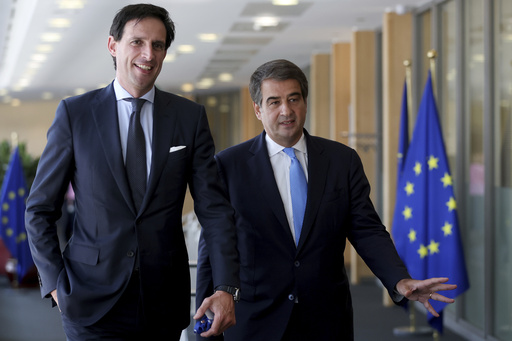
BRUSSELS — Following the European Union’s political shift to the right five months ago, the influence of nationalist and populist parties is poised to become apparent this week in Brussels. Lawmakers are set to evaluate the qualifications of new nominees for the EU’s executive branch, an increasingly significant part of the union’s governance.
Over the next five days, EU parliamentarians will conduct thorough hearings for 26 high-ranking officials who have been nominated by their respective national governments. The purpose is to determine their fitness to lead the European Commission on vital policy areas such as agriculture, trade, economic affairs, health, and migration. The Commission, as the only EU body tasked with drafting laws, has the authority to propose legislation that, once ratified by both Parliament and the Council of member states, becomes applicable across all 27 EU countries. These laws encompass a broad range of issues, from water quality standards to data protection and competition regulations.
Commission President Ursula von der Leyen has assembled her new cabinet, aiming to represent delicate political, geographic, and gender dynamics in a team that will steer the EU for the next five years. Notably, the majority of the proposed commissioners hail from the right-leaning factions, primarily the European People’s Party (EPP). This conservative coalition is the largest in Parliament and includes von der Leyen herself, which should facilitate her leadership as the Commission seeks to navigate through challenges ahead.
Nonetheless, the EPP has previously collaborated with further-right entities, including Italy’s Brothers of Italy, led by Prime Minister Giorgia Meloni, and nationalist lawmakers linked to Hungarian Prime Minister Viktor Orbán’s Fidesz party, to secure voting majorities. Other pro-European blocs experienced declines in strength during the June elections, allowing von der Leyen more freedom to operate independently. The second-largest bloc, the center-left Socialists and Democrats, appears set to endorse her nominees without any significant objections.
The Commission operates similarly to a national cabinet, with commissioners functioning in roles akin to government ministers. It shapes legislation affecting millions of lives across the EU, operating as the world’s largest trading bloc with around 450 million residents. Under von der Leyen’s leadership, the Commission manages an extensive workforce exceeding 33,000 employees and engages in negotiations related to trade agreements and global disputes, while also scrutinizing competition, especially in the tech sector concerning major corporations like Apple, Google, and Meta.
In her second term, von der Leyen’s new roster includes a diverse selection of nominees, with 14 members from the EPP and 10 women, highlighting a continued focus on gender representation. She has ensured collaboration with key EU members like France, Italy, and Spain to maintain stability in leadership. However, disappointment has arisen among mainstream parties with the appointment of Raffaele Fitto, a close ally of Meloni, to the vice presidential role overseeing cohesion policy, which allocates EU budget funds for infrastructure projects.
The Commission’s upcoming confirmation hearings will see various nominees face comprehensive questioning from committee leaders and experienced lawmakers relating to their assigned responsibilities. Each candidate must prove their competence, commitment to the EU, ability to work independently, and communication skills. Following the questioning, lawmakers will privately evaluate the candidates, with the requirement of achieving a two-thirds majority for approval. Those who do not meet this threshold may face additional queries or extended questioning.
Some candidates could face difficulties in their nominations. Lawmakers have previously rejected candidates as a display of strength, and disputes may lead to reshuffling of roles among the commissioners to appease parliamentary demands. The outcomes of the votes will remain confidential until the conclusion of the hearings on November 12, although anticipation of leaks is high, given the significant political implications involved.
Certain nominees appear to have more precarious prospects than others. The EPP and the far-right factions have orchestrated the hearing schedule, which places Fitto, a controversial nominee, at the forefront of questioning on the final hearing day. Any attempts to challenge him by mainstream lawmakers may backfire and jeopardize their preferred candidates.
Among the initial nominees will be Glenn Micallef, the socialist representative for youth, culture, and sport, from Malta. He faces scrutiny regarding his political experience compared to others with more significant portfolios. Marta Kos, a liberal candidate anticipated to oversee enlargement, has also been criticized for her perceived pro-Russian stance.
Oliver Varhelyi, known for his close ties to Orbán, has been assigned health and animal welfare responsibilities, a choice met with skepticism, particularly due to a previous incident where he disparaged lawmakers. Concerns persist over his leadership in health matters, especially considering Hungary’s preference for Russian and Chinese vaccines over EU resources. Rejecting his nomination could risk the entire process, given Orbán’s contentious relationship with the Commission, which may result in his refusal to present a replacement.
